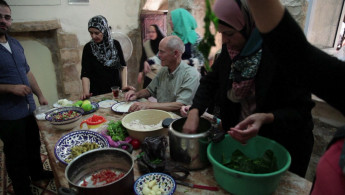Fighting the Palestinian cause with traditional cuisine
Fatima Kadumy's weapons of resistance include stuffed squash and yoghurt with garlic - for her, food is just as powerful as stones or petrol bombs.
"To defend the country some prefer war, but there are other, more pleasing, ways to do it," said Kadumy, a Palestinian who runs a cooking school in the West Bank city of Nablus that does much more than teach students proper knife skills.
| To defend the country some prefer war, but there are other, more pleasing, ways to do it |
Kadumy came up with the "crazy idea" seven years ago to use Palestinian traditional cuisine to promote her people's cause and act as an advocate for the independent state they have long sought.
Her efforts have not gone unnoticed. Since 2008, she has hosted more than 1,200 visitors from countries including China, Australia, Germany and the United States, among others.
"There are politics and resistance behind cuisine," she said in the small kitchen at her centre in Nablus's Old City that she has named Bait al-Karama, which is Arabic for House of Dignity.
"We show our city and our lives as we see them. Foreigners can then judge Palestinians from the inside."
On one recent day, an American couple from Washington learned how to prepare stuffed leaves and courgettes. A quiet but skilled chef, Nidal, led the class.
One of the Americans, Rex, said he appreciated an opportunity to "share the daily lives of residents" in Nablus, the site of heavy clashes during the second Palestinian intifada, or uprising, between 2000-2005.
Peace, love and hummus?
Before the cooking lesson, they followed Kadumy through the streets of the old city to buy local Palestinian produce - and only local Palestinian produce. Her organisation boycotts Israeli goods.
Kadumy says a meal sets the table for a talk about politics.
"And over a meal, we always talk more calmly, more easily," said Kadumy, wearing a blue and gold veil with her sunglasses balanced on top.
Her organisation is also part of the global Slow Food movement based in Italy that promotes local traditional cuisine, and she showcases dishes at the organisation's expo.
"For too long, we have allowed the Israelis to speak," Kadumy said. "Now there is the Israel stand, but also the Palestine stand."
Palestinians and Israelis do not only dispute territory - they also disagree about the origin of certain dishes.
One prominent example is hummus, the paste made from chickpeas so often associated with Middle Eastern cuisine.
Another is falafel, also made from chick peas but this time ground and deep-fried.
They do, however, tend to agree on one point when it comes to hummus: the best comes from Abu Shukri, a small restaurant in Jerusalem's Old City recommended by in-the-know tourist guides.
Yasser Taha inherited the restaurant opened by his father in 1948, the year Israel was created. He is not shy about taking credit for his family's sought-after recipe.
Empty plates for peace
"The Israelis learned to make hummus with us," he said of the dish with ancient and unclear origins.
"They watched and learned to make hummus and now they say that they invented it," he added with a smile.
A number of Israelis sat at tables among tourists on a recent day.
"Look at our plates - empty!" said Eldad, a 52-year-old who had come with his daughter, after polishing off the last bit of bread dipped in hummus with parsley and red ground sumac on top.
"We love to come here. It's delicious."
An Israeli woman named Neta who had driven for half an hour to come and eat in the Old City has bigger ambitions for the humble dish.
"Everyone loves hummus," she said. "It's something that we have in common. It can bring us together and bring peace."
Nearby postcard sellers don't necessarily share her vision - or at least they don't think that potential customers do.
Some postcards show falafel with an Israeli flag. But at other stores not far away, it's the black, red and white of the Palestinian flag.





 Follow the Middle East's top stories in English at The New Arab on Google News
Follow the Middle East's top stories in English at The New Arab on Google News


